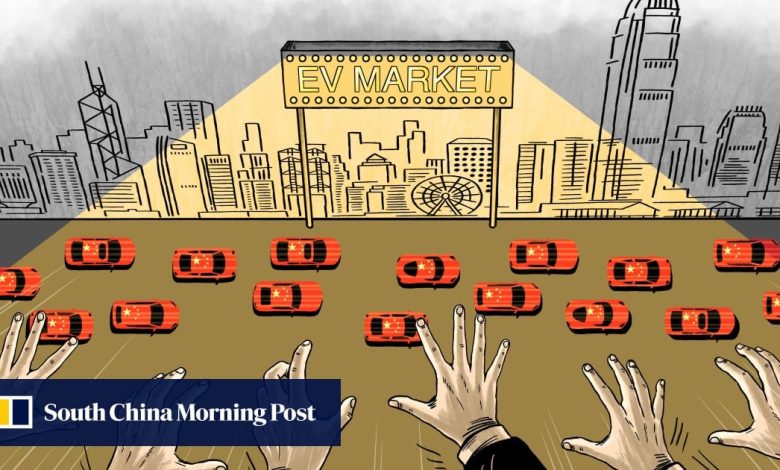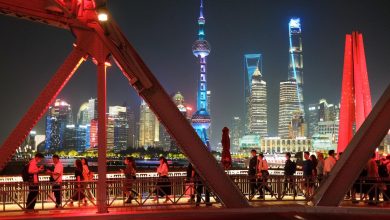Hong Kong is emerging as a key market and testing ground for Chinese EV makers. Here’s why

A total of 31 EV models from nine Chinese companies have been approved for sale by the Transport Department as of July 19, with prices ranging from HK$160,377 for Hozon New Energy Automobile’s Neta AYA Lite five-seater SUV to HK$619,190 for the SAIC Maxus Mifa 9 Premium multipurpose vehicle (MPV).
As there is a lot of competition among EV makers on the mainland, they may want to use Hong Kong as a stepping stone to enter overseas markets, said Wilson Lam, director of car distributor Zung Fu Group.
“On the mainland, consumers have their own unique culture and styles that they prefer,” said Lam. “Vehicles designed based on preferences on the mainland may not fit those in Europe, the Americas and Southeast Asia. These brands can make adjustments and improvements based on feedback from Hong Kong consumers.”
“The idea is not just to build a factory in Hong Kong, it’s about building an EV brand for Hong Kong,” founder and chairman Soh Weiming told the Post in June. Hong Kong is an ideal incubator for an EV brand with an international perspective because the city is not only close to mainland China, where a complete supply chain can be accessed, but it can also serve as a springboard to developed markets like Europe.
Hozon signed a memorandum of understanding last September with Hong Kong Science and Technology Parks Corporation to set up its international headquarters here, as part of a strategy to accelerate its development in Asia-Pacific.
“We have chosen Hong Kong as our international headquarters as it is an important market, and for strategic considerations,” said vice-president Zhou Jiang. “I think Hong Kong is suitable for Chinese new energy vehicle brands to study and to integrate some resources for local development, including research and development.”
The Shanghai-based carmaker aims to achieve a 15 per cent market share in Hong Kong within three years with its Neta brand, he said.
GAC Aion has already delivered nearly 100 EVs, a company spokesman said. With orders increasing each month, the goal is to sell some 2,000 units this year, he added.
“In the first half of 2024, we noticed the market share of mainland EV brands has grown larger, but it has not reached a stage where they are leading or dominating the market,” said Ray Leung, managing director of BMW Concessionaires (HK) in Hong Kong and Macau, which distributes the premium German marque.
“In the mass segment or non-premium segment, mainland EV brands may continue to grow or even play a leading role. They have a good range of products, a very attractive value proposition, and some of their cars are actually quite attractive. In this segment, there will be a large reshuffling of the market.
“But in the premium segment, I believe European brands will still maintain a certain degree of competitiveness and leading role.”
Tesla is the top EV brand in Hong Kong, with more than 40,000 registered vehicles, representing 47 per cent of the 86,938 electric private cars, according to the Post, which compiled the figures using Transport Department data from August 2017 to July 2024. BMW and Mercedes-Benz round off the top three with a market share of 10.9 per cent and 10.2 per cent, respectively.
BYD was the top mainland EV brand, with 8,416 registered vehicles and a market share of 9.7 per cent, followed by SAIC-owned MG at 2.7 per cent and 2,390 registered vehicles.
“Although Hong Kong is a very small city, it is an international city and is one of the best platforms for any EV brand to launch the product from Hong Kong to Asia-Pacific,” said Raymond Cheung, chief operating officer of BYD Hong Kong.
Hong Kong’s proximity to the mainland makes it very convenient to launch the cars and to test the waters before entering other markets, he said.
This year marks the 100th anniversary of MG, a UK marque now owned by SAIC. MG cars are made in China, but the design studio is based in the UK, according to Eric Wong, chairman of Richburg Corp, the distributor in Hong Kong.
MG’s entry into Hong Kong two years ago coincided with the start of the EV boom in the city, he said.
“We have taken this opportunity to develop the MG brand, using the first mover’s advantage,” Wong said. “We will aim for the number one position next year, when new right-hand drive product variants come to Hong Kong,” he added, noting that the two models are among the most popular EVs in the UK.
“Hong Kong is a stepping stone and testing ground. MG’s success and experience would definitely add value to the brand’s expansion to other markets.”

Not everyone is convinced about Hong Kong’s rise as an EV testing hub and launch pad.
Hong Kong has a high EV penetration rate and the ratio of charging facility is up to international standards, but the lack of policies and regulations for autonomous driving makes it less feasible for the city to become a testing hub for EVs, said Lawrence Iu, executive director of think tank Civic Exchange.
“If Hong Kong wants to be a testing hub for EVs but doesn’t let EV carmakers test autonomous driving, this makes it unattractive for mainland and overseas firms to bring their newest EV models or technology to Hong Kong to test it,” Iu said.
A lack of an ecosystem for EV batteries, a shortage of R&D talent and an insufficient quota for reskilling of technicians affect the feasibility of Hong Kong becoming an EV hub, he added.
Chan Ching-chuen, director of the research centre for EVs at the Hong Kong Polytechnic University and founding president of the World Electric Vehicle Association, said the city needs to further strengthen cooperation with mainland carmakers and firms in the EV supply chain if Hong Kong wants to become an EV testing hub.
“There still are not a lot of EVs made by Chinese brands in Hong Kong, and this shows that Hong Kong’s connection with the mainland on EVs is not very strong,” Chan said
The city also needs to work on improving its power grid and charging facilities for EVs, and in this regard Hong Kong can learn from China’s experience, he added.
The addition of new brands is increasing by the day.
Denza, a BYD-Mercedes luxury EV brand, started accepting pre-orders in Hong Kong for its D9 seven-seater MPV earlier this year. More than 500 D9 units, priced from HK$668,350, have been pre-ordered so far, according to distributor Zung Fu. Denza hopes to deliver the first batch of cars in the fourth quarter.
This was followed by Zeekr. Geely’s premium electric-vehicle brand debuted the right-hand drive variant of the 009 six-seater MPV in July.
“The market for cars in Hong Kong has become much more exciting,” said BMW’s Leung. “As an industry insider, I never thought that in such a small market with only 30,000 vehicles sold a year, there would be such a large influx of brands. This is something that we never imagined.”
The structure of the car market in Hong Kong and the brands’ balance of power has changed because of the shift to EVs, he added.
More than 5,000 EVs were registered for the first time in a month in Hong Kong in the private vehicles category in April, accounting for 91 per cent of new passenger cars, according to official data.
With nearly 1 million cars in the city, of which 820,000 are petrol and diesel powered, industry insiders believe there is a lot of potential for EV sellers as Hong Kong has mandated 90 per cent of all vehicles must be replaced by EVs by 2035.
“I believe that in the future, there will be more Chinese automotive brands entering Hong Kong, using the city as a doorway to the rest of the world,” said Fu Bingfeng, executive vice-president and secretary general of China Association of Automobile Manufacturers.






